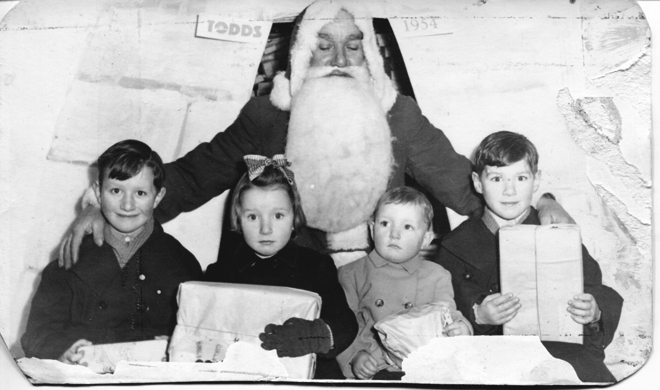The First Word
One Christmas was so much like another in those years, to quote Dylan Thomas. Looking back, it does seem as if all my childhood Christmases have fused into one glorious memory.
I remember the crunch of frosty gravel as we walk to the car for our trip to town and midnight Mass. The stars are bright in the night sky – easy to believe in the Three Wise Men making their way to Bethlehem – and the tree is lighted in the front room window. We are told not to look just in case Santa is there having the bottle of Guinness we set out for him earlier. If we caught sight of him all our presents would disappear, or so I believed.
The town is four miles away and we are silent and sleepy on the trip, bundled up in our winter woolens. Mother drives, father stays at home with the little ones. She always drives as if her entire focus is needed for the task, grasping the steering wheel with both hands, eyes on the road ahead. She prayed that way too, bringing intent and purpose to her responses at Mass – a little bit louder than anyone else.
Mass itself is a heady experience – the soft incantation of the Latin casting a spell into which is woven the beauty of the stained glass windows (from the Harry Clarke school), the choir, the altar boys brandishing the censer and the incense rising to the heavens. (I was reminded of this when I watched the film The Way, which culminates with the actors attending benediction at the Cathedral of Santiago in Spain).
My mother loved a celebration (no wonder she picked New Year’s Eve as her last day on earth!) Birthdays, feast days, Halloween, Shrove Tuesday were all given their due. But Christmas was special and took months of preparation and planning. Cakes were baked and plum puddings steamed, the turkey fattened and presents secreted away. Then there was the annual trip to Limerick City, far enough away to make it a day out, for the visit to Santa.
I didn’t realize it at the time, but not all Christmases were created equal. We were lucky. We weren’t rich but we had a farm and my mother had a way of stretching a pound. “Save your pennies and the pounds will take care of themselves,” she used to say.
And there were the Christmas packages from abroad – from the cousins in England and Aunt Nell in the Bronx who never let a Christmas go by without sending $50 – a lot of money back then.
I remember watching out for the postman, anxious for the airmail stamps on cards and letters. My Aunt Breda in Hawaii always sent a photo of her family taken at the beach with a palm tree in the background. There were cards from relatives in Australia, from my mother’s school friend in South Africa, and from cousins in London and Birmingham. I grew up feeling that our farm had outposts in all these places. And I knew that we had family out there who cared about us.
I didn’t yet know the word diaspora.
A recent article in the Economist, “The Magic of Diasporas,” highlighted the growing economic importance of diasporas. Huguenots, Jews and Scots were mentioned but not the Irish. Yet, the contributions the Irish abroad have made and continue to make to Ireland – from dollars sent by those like my Aunt Nell, to the Business 100 honorees profiled in this issue – have been enormous.
Sometimes, I feel that the American Irish love of Ireland is a one-sided affair. During the Celtic Tiger years the Irish in Ireland didn’t want anything to do with the diaspora, but now that times are bad again there is a push on to involve the diaspora in rebuilding the Irish economy. Yet, there has never been a representative of the Irish diaspora appointed to serve in the Irish Senate. The history of the diaspora is not taught in Irish schools, though many American, Australian and English universities have Irish Studies programs. Just as I grew up believing that all Irish Americans were rich, only to discover when I reached New York that Aunt Nell and her family existed on a bus driver’s salary, I believe that the Irish in Ireland need to have a better understanding of the sacrifices the Irish abroad have made over the years to help out at home.
In terms of diaspora, Bill Ford represents a family that has had a huge impact both on America and on Ireland. Henry Ford, on his first trip to Ireland in 1912, was struck by the poverty and unemployment in the land that his father left in 1847, and he decided to do something about it. In 1917 he opened a Ford plant in Cork. Seven thousand workers were employed at that plant up until the 1980s, and the ripple effect brought many social and economic improvements not just to Cork, but to the rest of the
country.
Recently, Ford brightened these bleak economic times by announcing that it would create 12,000 new jobs in the U.S. in the next four years. The company that put America on wheels is again showing corporate America the way forward.
“Built Ford Tough,” the ad for Ford trucks promises. It’s a slogan that reminds us of those ancestors who were tough. They went through hard times but they endured, and when they could they reached back a helping hand to those at home. Magic.


Recognized the Santa Have a similar picture of Todds 1955 which i would like to send to you.
Sean, we’d love to see it! To submit photos you can email us at submit@irishamerica.com.
Could sense the specialness of those times at the Harty home!
Loved the piece..